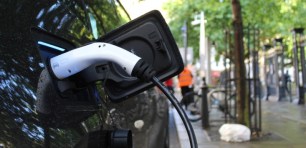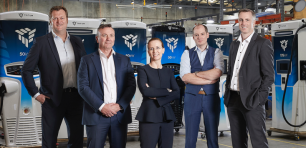
Founder and chief executive of auto tech startup Splend Chris King plans to increase its fleet of EV vehicles to 10,000 by 2024. Image: supplied.
Australian vehicle subscription startup Splend has raised $150 million to power further expansion and fuel its plans to increase its fleet of EV vehicles to 10,000 by 2024.
The funding round was led by UK-based Pollen Street Capital, a private capital asset manager focused on ESG-focused investments.
Partner at Pollen Street Capital Michael Katramados said the capital raise would support Splend’s mission to decarbonise rideshare and delivery services.
“Splend is dedicated to supporting its members through all aspects of on-demand driving and the team’s focus on transitioning the industry to green mobility is something we are proud to support,” Katramados said in a statement accompanying the announcement.
The Aussie-founded, London-based startup raised $3 million in a Series A round in 2017, with subsequent private funding in 2018 and 2020.
Splend, a subscription business that provides cars to rideshare and delivery drivers, along with vehicle financing tailored to the sector, currently leases cars in 10 cities across Australia and the UK via its 100-strong team.
The six year old company has spearheaded efforts in the gig economy to eliminate emissions — and will use the capital raise to accelerate this mission, founder and chief executive of Splend Chris King tells SmartCompany.
“It gives us that capital and that firepower to execute on our plans and grow,” King says.
“Where we’re wanting to take the company is being the leading provider of electric vehicles.”
Rideshare explosion fuelled Splend’s growth
Splend was launched in 2015 by then 27-year-old King, who had previously served as chief financial officer at national electrical services provider KP Electric. The Rich Lister was worth an estimated $46 million as of 2018.
The startup’s early years coincided with the wider rideshare industry boom as Uber and Lyft executed on hyper growth strategies that fuelled rapid global expansion.
As Silicon Valley startups were disrupting the taxi industry, King saw a gap in the market to give drivers a better deal than what they were getting from the platforms.
“I saw an opportunity as rideshare was taking off,” King explains.
While a raft of drivers were entering the ecosystem, traditional car leasing and finance was trailing behind the needs of the emerging industry.
“Car leasing didn’t cater to what was a disruptive, and a new segment that was forming. What was apparent is the usual cookie cutter way of providing … car finance … and car rental … just didn’t work,” he said.
Splend’s offering provides what it claims is a superior service across both. It gives drivers cost-effective car leases on better terms than that of competitors, combined with support across financial management, driver safety to promote a “sustainable income” via driving for platforms.
Leading on EV uptake
In early 2021 the company committed to swapping its petrol-driven cars in the UK for 1000 electric vehicles by the end of the year.
King announced at the time it would also be transitioning half of its 1500 vehicles in Australia to EVs by the end of this year.
He sees decarbonising transport as crucial to the industry’s long-term viability, but says federal and state commitments in recent months have helped the country catch up to other developed nations.
Australia lags significantly behind the rest of the world’s EV uptake, with only 0.75% of new cars sold in Australia in 2020 electric vehicles. This is compared to 8.1% in the state of California in the US, and 10.7% in the UK.
“Two years ago, I’d say [Australia] was lagging [behind] the rest of the world,” King said.
But “it’s been really exciting over the last 12 months, particularly. I’ve seen Australia [progress in] leaps and bounds.”
Splend’s commitment to a 10,000-strong EV fleet follows action by the rideshare giants to step up their sustainability credentials.
In 2021, Uber announced it would halve its service rates for EV drivers in Australia to help promote the uptake of electric vehicles.
Globally, Uber has also been investing, expanding Uber Green, its EV fleet, and committing $800 million in resources it says will help its drivers transition to EVs by 2025.
“I think the next 12 to 18 months is going to be very exciting for electric vehicle adoption in Australia,” King said.
King also welcomes the push for greater regulation for rideshare companies and the wider gig economy.
Global moves to guarantee minimum income and safety rules to better protect workers will stand to strengthen the entire industry, King says.
He sees government regulation to guarantee minimum pay conditions equivalent to those of employees as a positive.
“Fundamentally, what it’s doing is just putting in place some statutory minimums, which catches the very small infrequent situations where someone may be paid under the minimum.”
As the rideshare sector rebalances following the strain placed on the industry thanks to rolling lockdowns, King teases the startup’s plans to diversify in-line with its growth.
“We also want to be … not just the leader in rideshare,” he said.
He names an on-demand delivery product, along with a slew of partnerships to be announced in coming months.
“Right now we’re focused on the rideshare and delivery segments of the market — and being a leader in electric vehicles.
“Over time we want to branch out and provide our offering to other segments and types of businesses.”
Handpicked for you

Morrison unveils EV policy: What’s in it for startups and SMEs?



COMMENTS
SmartCompany is committed to hosting lively discussions. Help us keep the conversation useful, interesting and welcoming. We aim to publish comments quickly in the interest of promoting robust conversation, but we’re a small team and we deploy filters to protect against legal risk. Occasionally your comment may be held up while it is being reviewed, but we’re working as fast as we can to keep the conversation rolling.
The SmartCompany comment section is members-only content. Please subscribe to leave a comment.
The SmartCompany comment section is members-only content. Please login to leave a comment.